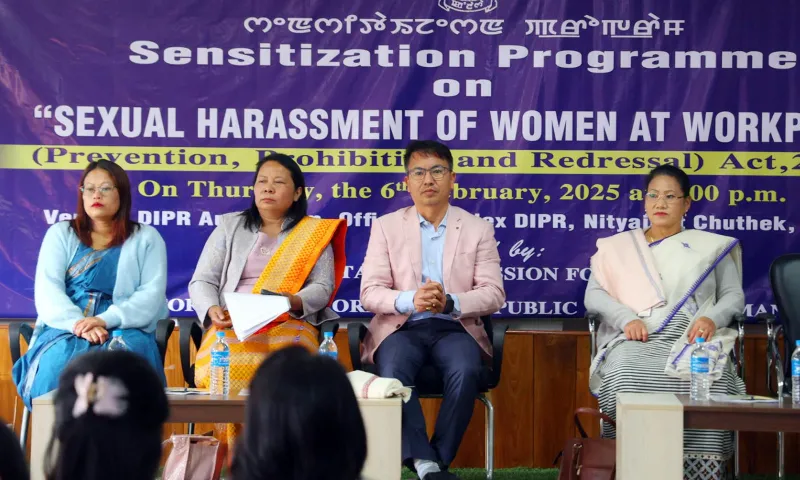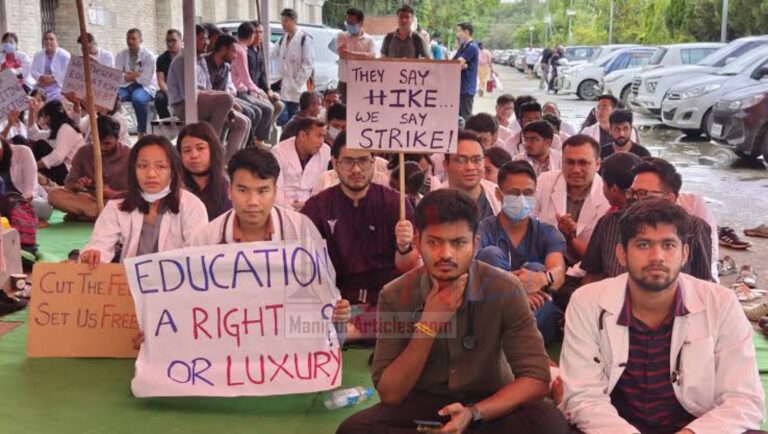Manipur MSCW Calls for Workplace Sexual Harassment Prevention: A Push for Safer Workplaces in the State
Group 1: News Summary
The Manipur MSCW (Manipur State Commission for Women) has recently taken a bold stand by calling for enhanced measures to prevent workplace sexual harassment. This significant move underscores the commitment to creating safer and more respectful work environments across the state. The call for action not only highlights the urgent need for effective policies and awareness campaigns but also aims to empower women by ensuring that their rights and dignity are upheld in professional settings.
Group 2: In-Depth Analysis: Manipur MSCW’s Drive for Workplace Sexual Harassment Prevention
Introduction
Hey there! If you’ve ever wondered what it really takes to create a safe and respectful work environment, then you’re about to dive into an important discussion that’s making waves in Manipur. The Manipur State Commission for Women (MSCW) is spearheading a critical initiative aimed at preventing workplace sexual harassment. This isn’t just another bureaucratic announcement—it’s a heartfelt call to action designed to protect the rights, dignity, and well-being of women in the workplace. So, let’s sit back, relax, and explore how this initiative is set to reshape the professional landscape in Manipur.
Understanding the Need for Workplace Sexual Harassment Prevention
Workplace sexual harassment is a pervasive issue that can affect anyone, but it disproportionately impacts women. It creates an environment of fear, disrespect, and inequality. When you think about it, a workplace should be like a well-oiled machine where everyone works harmoniously, much like a symphony where every instrument plays its part. However, when harassment creeps in, it’s like a discordant note that disrupts the entire performance.
The need for robust policies to prevent such behavior is more urgent than ever. In many workplaces, victims often feel powerless and voiceless, trapped in an environment where their safety and career progression are at risk. By calling for workplace sexual harassment prevention, the Manipur MSCW is addressing a problem that not only tarnishes professional environments but also deeply affects the personal lives and mental health of individuals. This initiative is about reclaiming dignity and ensuring that every employee, regardless of gender, feels safe and valued.
The Role of the Manipur MSCW
So, what exactly is the Manipur MSCW, and why does its voice matter? The MSCW is an autonomous body dedicated to safeguarding the rights and interests of women in the state. Think of it as a guardian angel for women in Manipur, working tirelessly to ensure that issues like harassment, discrimination, and injustice are addressed head-on. When the MSCW calls for the prevention of workplace sexual harassment, it isn’t merely issuing a statement—it’s setting a standard for all employers to follow.
The commission’s call is a reminder that women deserve a work environment free from fear and misconduct. It emphasizes the importance of having clear policies and procedures that not only deter harassment but also provide immediate support and recourse for victims. In essence, the MSCW is pushing for accountability and transparency, urging organizations to implement effective measures and foster a culture of respect.
Why Workplace Sexual Harassment Prevention Matters
Let’s break it down further. Why is it so important to address sexual harassment in the workplace? Imagine starting your day, excited to go to work, only to be met with unwelcome advances, derogatory remarks, or even physical threats. It’s not just uncomfortable—it’s deeply damaging. Workplace harassment can lead to severe mental health issues such as anxiety, depression, and post-traumatic stress disorder (PTSD). Moreover, it can derail professional growth, leaving talented individuals feeling undervalued and marginalized.
On a broader scale, a toxic work environment hampers productivity and can tarnish a company’s reputation. When employees feel unsafe or disrespected, it can lead to high turnover rates and a loss of trust, not only within the organization but also in the wider community. Therefore, preventing sexual harassment isn’t just a moral imperative; it’s essential for the overall health of an organization and, by extension, the economy.
The Call to Action: What the MSCW is Asking For
The Manipur MSCW is advocating for a multi-pronged approach to tackle workplace sexual harassment. Here’s what their call to action entails:
- Stricter Enforcement of Existing Policies:
The MSCW emphasizes that it’s not enough to have policies on paper; they must be effectively implemented and enforced. This means regular audits, clear reporting mechanisms, and prompt action against perpetrators. - Awareness and Sensitization Programs:
Education is a powerful tool. The MSCW calls for comprehensive training sessions and workshops that educate employees about what constitutes sexual harassment, how to report it, and the importance of creating a respectful workplace culture. - Support Systems for Victims:
Victims of harassment need immediate and compassionate support. The commission recommends that workplaces establish dedicated support channels, including counseling services and legal assistance, to help victims navigate the aftermath of harassment. - Zero-Tolerance Policy:
A zero-tolerance approach sends a strong message that harassment will not be tolerated under any circumstances. The MSCW advocates for a strict punitive framework for those found guilty of engaging in such behavior. - Regular Policy Reviews:
The work environment is continually evolving, and so should the policies that govern it. Regular reviews and updates to the harassment policies ensure they remain relevant and effective in addressing new challenges.
The Impact on Women and the Workplace
When we talk about preventing workplace sexual harassment, we’re talking about creating an environment where every individual can thrive without fear. For women, in particular, this initiative is a beacon of hope. It’s about ensuring that women are not forced to choose between their careers and their personal safety. A safe workplace enables women to perform at their best, contribute fully to the organization, and pursue career advancement without the burden of harassment.
Think of it like gardening—when you remove the weeds, the plants have room to grow and flourish. By eradicating harassment, organizations can cultivate a more inclusive and productive atmosphere, where talent is nurtured and diversity is celebrated. This not only benefits individual employees but also enhances the overall performance and reputation of the organization.
The Broader Societal Implications
Workplace sexual harassment isn’t confined to individual organizations—it’s a societal issue that reverberates far beyond the office walls. When victims speak up and organizations take decisive action, it sets a precedent for broader cultural change. It encourages other sectors and states to follow suit, creating a ripple effect that gradually transforms societal norms around gender and respect.
Moreover, preventing workplace harassment contributes to a more equitable society. When women are empowered to work in safe environments, they are more likely to participate actively in the economy, pursue leadership roles, and influence decision-making processes. This, in turn, drives positive social change and helps dismantle long-standing gender inequalities.
Challenges in Implementing Effective Policies
While the call for prevention is both necessary and commendable, implementing effective policies is no easy feat. Organizations may face several challenges, such as:
- Cultural Resistance:
In some cases, deep-seated cultural norms and biases can hinder the acceptance and implementation of strict harassment policies. Changing mindsets requires time, persistent effort, and continuous education. - Lack of Awareness:
Many employees might not fully understand what constitutes sexual harassment or how to report it. This gap in awareness can lead to underreporting and a lack of accountability. - Fear of Reprisal:
Victims may fear retaliation or damage to their careers if they speak out. Ensuring confidentiality and providing robust support systems is crucial to overcoming this barrier. - Inadequate Training:
Without proper training for management and HR personnel, even the best policies can fall short in practice. Continuous professional development is essential to ensure that those responsible for enforcing the policies are well-equipped to handle sensitive situations. - Resource Constraints:
Smaller organizations may struggle with the financial and logistical resources needed to implement comprehensive harassment prevention programs. In such cases, government support and public-private partnerships can play a vital role.
Learning from Global Best Practices
It’s always helpful to look beyond our borders when addressing complex issues like workplace harassment. Around the world, many countries have successfully implemented policies and programs that could serve as models for Manipur. For instance, some organizations have adopted anonymous reporting systems, which empower employees to report incidents without fear of backlash. Others have instituted regular, mandatory training sessions that cover topics ranging from bystander intervention to sensitivity training.
These global best practices underscore the importance of a proactive approach. Just as a chef refines a recipe through trial and error, organizations can continuously improve their policies by learning from successful initiatives elsewhere. By adapting and customizing these strategies to fit the local context, Manipur can set a new standard for workplace safety and inclusivity.
The Role of Technology in Prevention
In today’s digital age, technology can be a game-changer in the fight against workplace harassment. Imagine having a smart assistant that not only schedules your meetings but also monitors workplace behavior and flags potential issues before they escalate. While we might not be at that level yet, digital tools can certainly help.
Many organizations are now leveraging online platforms for reporting incidents anonymously, tracking complaints, and providing real-time support to victims. Mobile apps, dedicated hotlines, and web-based training modules can all contribute to a safer work environment. These technologies not only streamline the reporting process but also ensure that data is collected and analyzed to identify trends and areas needing improvement.
Empowering Employees Through Education
Education is the cornerstone of any successful prevention strategy. When employees are well-informed about their rights and the resources available to them, they are more likely to stand up against harassment. Educational initiatives can take many forms—from interactive workshops and seminars to online courses and awareness campaigns.
Imagine attending a workshop where the topic isn’t just theoretical but is brought to life through real-world examples, role-plays, and engaging discussions. Such sessions can demystify complex legal concepts and empower employees with practical strategies to handle difficult situations. Moreover, continuous education reinforces the idea that preventing harassment is a collective responsibility—a value that benefits everyone in the workplace.
Creating a Culture of Respect and Accountability
At the heart of any effective harassment prevention strategy is a culture of respect and accountability. This means that every individual, from the top executive to the newest intern, must understand and embrace the values of dignity and equality. Leaders play a pivotal role in modeling this behavior. When management takes a firm stand against harassment and consistently enforces policies, it sends a powerful message to all employees: disrespectful behavior will not be tolerated.
Building such a culture is much like cultivating a garden—it requires consistent care, attention, and a commitment to nurturing positive growth. Celebrating diversity, encouraging open communication, and recognizing acts of respect can all contribute to a more harmonious and productive work environment.
The Economic Benefits of a Harassment-Free Workplace
Beyond the ethical and legal imperatives, there are significant economic benefits to creating a harassment-free workplace. When employees feel safe and respected, they are more likely to be engaged, motivated, and productive. This translates to lower turnover rates, reduced absenteeism, and higher overall job satisfaction. In other words, investing in harassment prevention isn’t just the right thing to do—it’s also a smart business decision.
Organizations that prioritize employee well-being often see improvements in creativity, innovation, and collaboration. Think of it as investing in premium fuel for your company’s engine: when everyone is operating at their best, the organization can achieve greater heights and drive sustainable growth.
Collaboration Between Government, Industry, and Civil Society
Achieving lasting change requires a collaborative approach. The Manipur MSCW’s call for workplace sexual harassment prevention is a clarion call to all stakeholders—government bodies, private companies, and civil society organizations—to work together. By pooling resources, sharing expertise, and fostering open dialogue, these groups can develop comprehensive strategies that are both effective and sustainable.
Imagine a community coming together to build a robust safety net—each person contributing their unique skills and perspectives. This is precisely the kind of collective effort needed to tackle the complex issue of workplace harassment. Through partnerships, joint initiatives, and ongoing dialogue, Manipur can build a framework that not only prevents harassment but also supports survivors and promotes long-term cultural change.
The Road Ahead: Policy Recommendations and Future Prospects
Looking forward, the path to a harassment-free workplace in Manipur involves both immediate actions and long-term strategies. Here are some key recommendations that can help pave the way:
- Legislative Reforms:
Consider revisiting and strengthening the legal framework around workplace harassment. Clear, comprehensive laws that protect victims and hold perpetrators accountable are essential. - Mandatory Training Programs:
Implement regular training sessions for all employees, with a special focus on leadership. This ensures that everyone understands the standards of behavior expected in the workplace. - Anonymous Reporting Mechanisms:
Establish safe and confidential channels for reporting incidents of harassment. This could include hotlines, online portals, or third-party reporting services. - Regular Audits and Assessments:
Conduct periodic reviews of workplace policies and their implementation. This helps identify gaps and areas for improvement, ensuring that the measures remain effective and relevant. - Support and Rehabilitation Programs:
Develop comprehensive support systems for victims, including counseling, legal aid, and rehabilitation programs. Empowering survivors is a crucial step in building a resilient workforce. - Public-Private Partnerships:
Encourage collaboration between the government and private sector to fund and implement harassment prevention initiatives. Such partnerships can bring in diverse expertise and ensure broader reach.
Conclusion: A New Era for Safer Workplaces in Manipur
In wrapping up our deep dive into the Manipur MSCW’s call for workplace sexual harassment prevention, one thing is abundantly clear: this initiative is a significant milestone in the journey towards creating safer, more respectful work environments. The call to action is not just about enforcing policies—it’s about changing mindsets, fostering a culture of accountability, and ensuring that every individual can thrive without fear.
By addressing workplace harassment head-on, Manipur is setting an example for other regions to follow. The MSCW’s efforts remind us that safety and respect in the workplace are not optional—they are fundamental rights that every employee deserves. As we move forward, it’s imperative that organizations, government bodies, and society at large continue to work together to eradicate harassment and build a future where every worker feels valued and secure.
So, the next time you walk into your office, remember that initiatives like these are paving the way for a brighter, more inclusive tomorrow. Let’s support these efforts, engage in open conversations, and contribute to a culture where respect is the norm and harassment is a thing of the past. After all, a safe workplace isn’t just beneficial for employees—it’s a win for the entire community.
FAQs
- What is the role of the Manipur MSCW in preventing workplace sexual harassment?
The Manipur MSCW (Manipur State Commission for Women) is dedicated to safeguarding women’s rights and ensuring safe work environments. Their call for preventing workplace sexual harassment involves urging organizations to enforce strict policies, provide support to victims, and create a culture of respect and accountability. - Why is workplace sexual harassment prevention important for both employees and organizations?
Preventing workplace sexual harassment is crucial because it protects employees’ mental and physical well-being, fosters a respectful and productive work environment, and ultimately contributes to improved job satisfaction and organizational performance. - What measures does the MSCW recommend to combat workplace sexual harassment?
The MSCW recommends a multi-pronged approach that includes stricter enforcement of policies, comprehensive awareness and training programs, anonymous reporting mechanisms, support systems for victims, and regular policy reviews to ensure effectiveness. - How can technology help in preventing workplace sexual harassment?
Technology can play a significant role by facilitating anonymous reporting, tracking incidents, and providing online training modules. Digital tools enable organizations to monitor workplace behavior more effectively and ensure prompt action when issues arise. - What long-term benefits can arise from creating a harassment-free workplace?
A harassment-free workplace leads to higher employee engagement, increased productivity, reduced turnover, and overall better organizational morale. Moreover, it fosters a culture of respect and equality, benefiting the broader community and contributing to sustainable economic growth.




